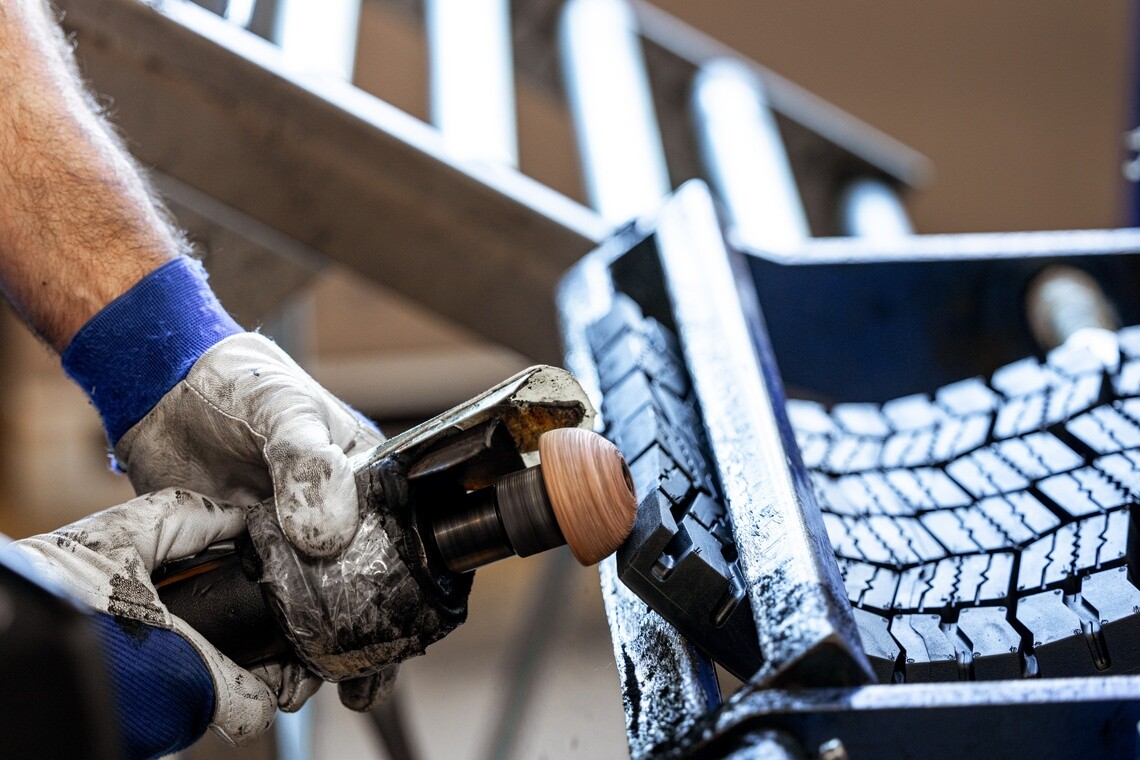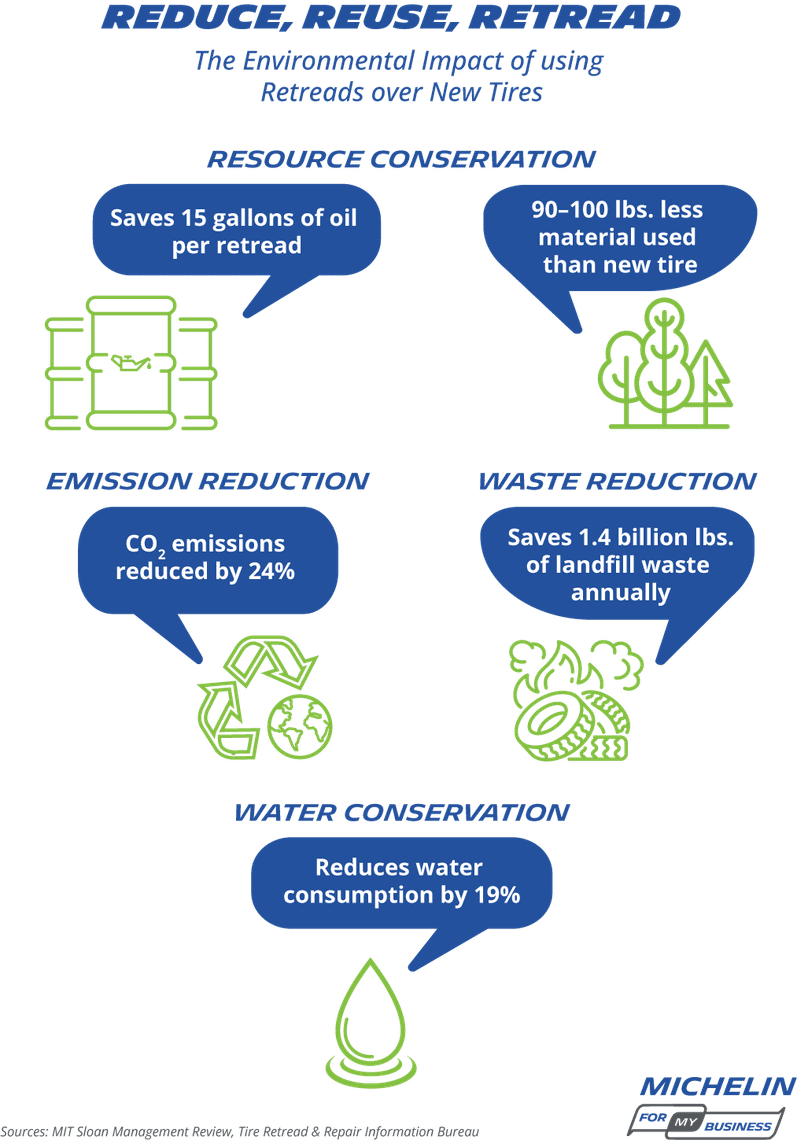
Michelin retread tire being created
In the trucking industry, where every penny counts, striking a balance between cost and performance is crucial. Budget-conscious truckers and fleet managers are often tempted by low-cost import tires. While these tires may appear to save money upfront, they often fall short in terms of durability, safety, and overall value. Quality retreads, such as Michelin retread tires, offer a compelling alternative that combines Michelin quality with significant cost savings and environmental benefits.
Some smaller fleets are lured by the low acquisition cost of imported tires. However, all the big boys track their costs carefully and have learned that these tires are not always what they appear.
– Jim Garrett, Michelin Product Category Manager
Understanding Retreads: Quality Matters
Retread tires, also called recap tires, are not all created equal. Retreading takes a worn tire casing and applies a new tread, giving the casing a new life. The quality of the retreading process and the materials used significantly impact the performance and safety of the retread.
Here are some key factors to consider when choosing retread tires:
- • Casing Quality: The foundation of a retread tire is the casing. Michelin casings are designed and manufactured for multiple retread cycles, ensuring they can withstand the demands of retreading. Low-cost import tires may not be suitable for retreading after their initial use.
- • Retreading Process: Michelin uses a state-of-the-art retreading process that includes rigorous inspections, process audits, and high-quality materials. Michelin retreads go through the same testing as new Michelin tires to ensure they meet performance standards.
- • Reduced Environmental Impact: Choosing Michelin retreads is an environmentally friendly decision. Retreading helps conserve resources by giving new life to existing tire casings, reducing the need to manufacture entirely new tires from scratch. This translates to a smaller environmental footprint for your fleet.
Why Choose Michelin Retreads? Top Reasons to Make the Switch
Michelin retreads offer several advantages over low-cost import tires, making them a smart choice for truckers and fleet managers focused on value and performance:
- • Superior Quality and Performance: Michelin builds its reputation as a quality tire manufacturer, and our retread tires are no exception. As with new tires, Michelin retreads are engineered to deliver exceptional performance in terms of tread life, durability, and fuel efficiency. This can translate to lower operating costs over time, including reduced fuel consumption.
- • Extended Casing Life: As mentioned previously, Michelin casings are built to last through multiple retread cycles. This allows you to get more mileage out of your casings, reducing overall tire costs for your fleet and minimizing waste.
- • Brand Warranty: Michelin retreads are backed by a comprehensive warranty that covers both the casing and retread. This can give you greater peace of mind knowing you're protected when on the road.
- • Retreading Expertise: Michelin has extensive experience and expertise in tire retreading. Research and development extends to both retread design and retreading process improvements, ensuring Michelin retreads provide and deliver optimal performance.
- • Nationwide Support Network: Michelin has a large network of authorized retreaders and service centers across the country. This means you can get assistance with Michelin retreads almost anywhere, reducing downtime if you experience a problem on the road.
Are Retread Tires Safe? Dispelling Common Myths
One of the biggest concerns some truckers have about retreads is safety. However, when properly manufactured and inspected, Michelin retreads are just as safe as new tires. They undergo rigorous inspections to ensure they meet the same safety standards as new Michelin tires.
Here are some additional points to consider:
- • Michelin Retreading Process: Michelin uses a state-of-the-art, 9-step retreading process that adheres to strict quality control standards.
- • Regulatory compliance: Michelin retreads must meet all the same Department of Transportation (DOT) regulations as new tires.
- Want to learn more? Check out our Debunking Myths about Retreads article.
The Bottom Line: Unmatched Value with Michelin Retreads
While both retread tires and low-cost import tires offer a lower price point compared to new premium tires, price alone does not tell the entire story. Michelin retreads provide significant advantages in terms of quality, durability, performance, safety, and environmental impact. They deliver exceptional value without compromising on the performance and safety you need for your fleet.
By choosing Michelin retreads, you can:
- • Keep your trucks on the road longer
- • Reduce operating costs
- • Minimize your environmental footprint
- • Benefit from a trusted brand with a proven track record
- • Offer additional benefits in casing quality, retreading expertise, warranty coverage, and a nationwide support network.
"Often, [low-cost imports] end up costing more (than retreads) in the end with more issues on the road, more complexity in managing tire changes, and more unusable casings to deal with in the end – increasing their environmental footprint," said Garrett. "This is why virtually all large fleets use high quality new and retreaded tires instead of low-cost new tires.”
- https://acutread.com/import-tires-vs-premium-retread-tires/
- https://www.gminsights.com/industry-analysis/tire-retreading-market
- https://www.tirereview.com/retreading-growth-after-pandemic/
- https://tiresos.com/understanding-retread-tires-safety-and-benefits/
- https://tirehungry.com/retreaded-vs-new-tires/
- https://www.tirerecappers.com/tire-recappers-news/made-usa-retreads-better-new-imported-tires/
- https://www.theboxtrucklady.com/blogs/box-truck-blog/the-sustainable-choice-the-advantages-of-retreading-truck-tires
- https://acutread.com/protecting-tire-casings-for-retreading/
- https://www.retread.org





